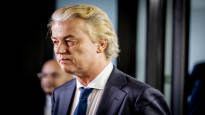The radical right comes to power for the first time in the Netherlands. The politician who doesn’t even become a minister gets the most influence.
Leonard Wilhelmus editor
Holland takes a historic leap to the right.
After almost half a year of government negotiations, the parties reached an agreement on the government program on Wednesday.
However, the parties have not said who will become prime minister. This is exceptional.
Since the 1980s, the Dutch prime minister has always been the chairman of the election winner, i.e. the largest party in the country. There was no ambiguity about the largest party in the last election.
Geert Wilders the radical right-wing Freedom Party overwhelmingly won the parliamentary elections last November. The parties following Kaula were almost ten percentage points.
Still, Wilders will not become Dutch prime minister.
The reason is that one of the partner parties in particular, the center-right NSC, did not want Wilders to be the country’s official leader.
Wilders has been convicted of hate speech, and his election program contained numerous unconstitutional positions. His party has always been excluded from governments in the past.
However, even before the elections, the center-right ruling party VVD said it was ready for cooperation.
After the election result, it became more and more difficult to ignore Wilders. Especially since the voters of all the parties now entering government wanted a right-wing government.
It made the governing parties come up with different formalities. Their purpose is to obscure how big a political change Wilders’ rise to power is.
The board meetings began exceptionally, about things that should be self-evident: the rules of the game of the constitution and the rule of law. The discussion reminded me of Orpo’s government’s communication from last summer, where the governing parties assured that they do not accept racism.
The ministerial arrangement is also special.
The chairmen of the governing parties agreed that none of them would become a minister. Government negotiators also decided that half of the ministers will come from outside the parties. They can be officials or experts, for example.
However, the ministerial game looks like an eye-rolling trick by the governing parties, the purpose of which is to hide Wilders’ power.
Although Wilders will not become prime minister, he still has the most political power as the leader of the largest governing party. He also gets to choose the prime minister. However, the other parties must accept Wilders’ candidate.
Even the far-right leader himself is aware of his position of power. It was evident in his speech at the presentation of the government program on Thursday:
Wilders’ position is also underlined by his complete grip on his own party. Wilders is the only member of his party, and all members of the party’s parliamentary group follow his line closely.
Wilders’ handprint can be seen strong today in the government program announced on Thursdayalthough he had to make a lot of concessions during the negotiations.
There will be significant tightening of immigration and asylum policy. That has been Wilders’ most important goal and the number one wish of his voters.
Among other things, the government intends to activate the crisis law to limit the income of asylum seekers for two years. Residence permits are made temporary, deportations are tried to speed up, family reunification is made more difficult.
Wilders’ Holland first thinking is also reflected in the government’s housing policy. In the future, those who have received asylum may no longer be given priority for social rental apartments based on their asylum status alone.
The strictures also affect international students. The government intends to set an upper limit for their number. In addition, the government will raise tuition fees for students from outside the EU and increase the number of degrees in Dutch.
After the elections, the international media and Finland paid a lot of attention to Wilders’ positions on Ukraine. Wilders wanted to end arms aid to Ukraine.
He gave in on that question, and in the government program the parties assure that the support for Ukraine will continue.
